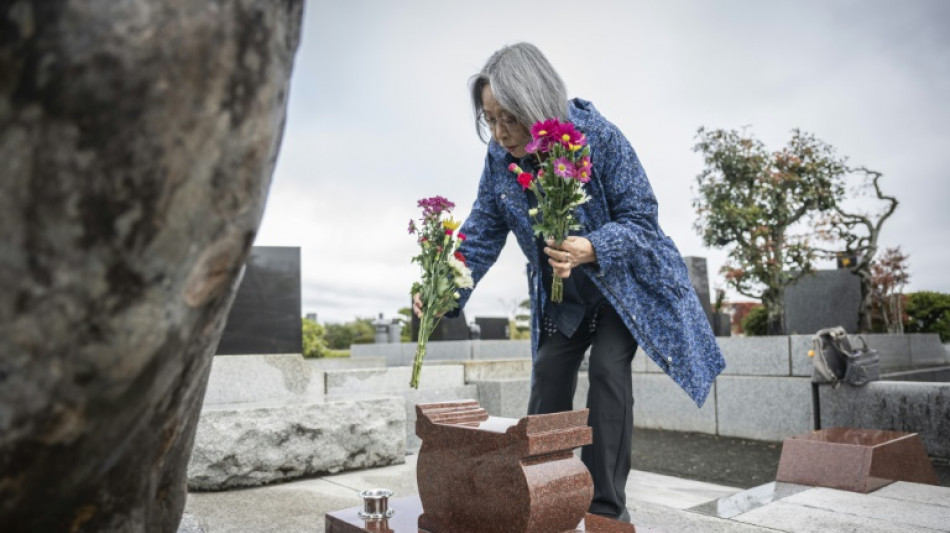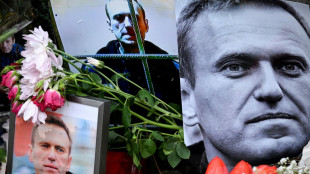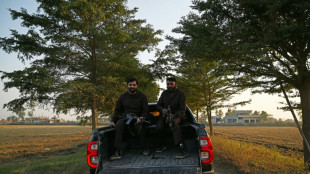
-
 'Draconian' Vietnam internet law heightens free speech fears
'Draconian' Vietnam internet law heightens free speech fears
-
Israeli women mobilise against ultra-Orthodox military exemptions

-
 Asian markets track Wall St rally as US inflation eases rate worries
Asian markets track Wall St rally as US inflation eases rate worries
-
Tens of thousands protest in Serbian capital over fatal train station accident

-
 Trump vows to 'stop transgender lunacy' as a top priority
Trump vows to 'stop transgender lunacy' as a top priority
-
Daniels throws five TDs as Commanders down Eagles, Lions and Vikings win

-
 'Who's next?': Misinformation and online threats after US CEO slaying
'Who's next?': Misinformation and online threats after US CEO slaying
-
Only 12 trucks delivered food, water in North Gaza Governorate since October: Oxfam

-
 Langers edge Tiger and son Charlie in PNC Championship playoff
Langers edge Tiger and son Charlie in PNC Championship playoff
-
Explosive batsman Jacobs gets New Zealand call-up for Sri Lanka series

-
 Holders PSG edge through on penalties in French Cup
Holders PSG edge through on penalties in French Cup
-
Slovak PM Fico on surprise visit to Kremlin to talk gas deliveries

-
 Daniels throw five TDs as Commanders down Eagles
Daniels throw five TDs as Commanders down Eagles
-
Atalanta fight back to take top spot in Serie A, Roma hit five

-
 Mancini admits regrets over leaving Italy for Saudi Arabia
Mancini admits regrets over leaving Italy for Saudi Arabia
-
Run machine Ayub shines as Pakistan sweep South Africa

-
 Slovak PM Fico on surprise visit to Kremlin
Slovak PM Fico on surprise visit to Kremlin
-
Gaza rescuers say Israeli strikes kill 35

-
 'Incredible' Liverpool must stay focused: Slot
'Incredible' Liverpool must stay focused: Slot
-
Maresca 'absolutely happy' as title-chasing Chelsea drop points in Everton draw

-
 Salah happy wherever career ends after inspiring Liverpool rout
Salah happy wherever career ends after inspiring Liverpool rout
-
Three and easy as Dortmund move into Bundesliga top six

-
 Liverpool hit Spurs for six, Man Utd embarrassed by Bournemouth
Liverpool hit Spurs for six, Man Utd embarrassed by Bournemouth
-
Netanyahu vows to act with 'force, determination' against Yemen's Huthis

-
 Mbappe back from 'bottom' as Real Madrid down Sevilla
Mbappe back from 'bottom' as Real Madrid down Sevilla
-
Ali hat-trick helps champions Ahly crush Belouizdad

-
 France kept on tenterhooks over new government
France kept on tenterhooks over new government
-
Salah stars as rampant Liverpool hit Spurs for six

-
 Syria's new leader says all weapons to come under 'state control'
Syria's new leader says all weapons to come under 'state control'
-
'Sonic 3' zips to top of N.America box office

-
 Rome's Trevi Fountain reopens to limited crowds
Rome's Trevi Fountain reopens to limited crowds
-
Mbappe strikes as Real Madrid down Sevilla

-
 'Nervous' Man Utd humiliated by Bournemouth
'Nervous' Man Utd humiliated by Bournemouth
-
Pope again condemns 'cruelty' of Israeli strikes on Gaza

-
 Lonely this Christmas: Vendee skippers in low-key celebrations on high seas
Lonely this Christmas: Vendee skippers in low-key celebrations on high seas
-
Troubled Man Utd humiliated by Bournemouth

-
 2 US pilots shot down over Red Sea in 'friendly fire' incident: military
2 US pilots shot down over Red Sea in 'friendly fire' incident: military
-
Man Utd embarrassed by Bournemouth, Chelsea held at Everton

-
 France awaits fourth government of the year
France awaits fourth government of the year
-
Germany pledges security inquest into Christmas market attack

-
 Death toll in Brazil bus crash rises to 41
Death toll in Brazil bus crash rises to 41
-
Joshua bout only fight left for beaten Fury says promoter Hearn

-
 Odermatt stays hot to break Swiss World Cup wins record
Odermatt stays hot to break Swiss World Cup wins record
-
Neville says Rashford's career at Man Utd nearing 'inevitable ending'

-
 Syria's new leader vows not to negatively interfere in Lebanon
Syria's new leader vows not to negatively interfere in Lebanon
-
Germany pledges security inquest after Christmas market attack

-
 Putin vows 'destruction' on Ukraine after Kazan drone attack
Putin vows 'destruction' on Ukraine after Kazan drone attack
-
Understated Usyk seeks recognition among boxing legends

-
 France awaits appointment of new government
France awaits appointment of new government
-
Cyclone Chido death toll rises to 94 in Mozambique


Japan's A-bomb survivors: from discrimination to a Nobel
Survivors of the US atomic bombings of Japan will receive the Nobel Peace Prize on Tuesday but, after years of anti-nuclear campaigning and showing the world their scars, they still retain the painful memories of the discrimination they have faced.
After the 1945 US bombings of Hiroshima and Nagasaki led to Japan's surrender and the end of World War II, many people who survived the attacks were shunned by society.
Prejudice related to their exposure to radiation made it hard for them to find jobs and affected their prospects for marriage, leading one small group in Tokyo to build a communal grave where dozens were buried together.
There are currently around 106,800 A-bomb survivors, known as "hibakusha", in Japan, according to the government. Their average age is 85.
One of them is 90-year-old Reiko Yamada, who was 11 and lived in Hiroshima when the United States dropped the first atomic bomb on August 6, 1945, killing around 140,000 people.
That attack, and another three days later on Nagasaki where 74,000 people were killed, inflicted severe injuries and radiation-related illnesses on those who survived.
"People faced extreme discrimination" over their scars and exposure to radiation, Yamada told AFP.
"In the past, people told hibakusha, 'Don't get married' or 'Don't come close. You are infectious'," she said.
"Some people lost their whole family in Hiroshima or Nagasaki, and even though they stayed with relatives, they were stripped of what they used to own and were bullied."
Yamada, who lives in Tokyo, has assisted fellow hibakusha for nearly six decades, travelling worldwide to share her experiences.
"When I visited the homes of hibakusha, some of them would whisper to me: 'You are a hibakusha, right? I don't say anything about it to my children,'" she said.
- Shared grave -
The Peace Prize was won by Nihon Hidankyo, a large grassroots group of A-bomb survivors who campaign for their members' rights and a world free of nuclear weapons.
But the prize came too late for many early campaigners who had spoken out about their trauma and physical wounds, hoping to prevent others from suffering as they had.
Terumi Tanaka, Nihon Hidankyo's 92-year-old co-chair, told reporters recently that it was "sad and frustrating" that "so many people who stood next to me, people who led the movement" were not there to share the honour of the Nobel.
After World War II, young people including hibakusha were drawn to big cities such as Tokyo for work and education.
Many survivors chose to live in relative isolation, finding that Tokyo's dense population allowed them to "hide", said Michiko Murata, 73, who helps run Toyukai, an association of hibakusha in the capital.
"Many people struggled a lot," Murata said, often deciding not to have children because of worries over the effects of radiation.
Some members of Toyukai built a shared grave in western Tokyo in 2005 and Murata helps maintain it.
But as they get older, holding an annual mourning ceremony there has become too difficult and will end next year.
The remains of around 60 people are buried under the large, rocky gravestone.
"We inscribe here with our lives: Never tolerate nuclear bombs," a stone plaque next to the tomb says.
Many remembered there were hibakusha without relatives to give them a proper funeral.
"They lived alone. So after they died, they wanted to be with others, in a place where they can talk about Hiroshima and Nagasaki without fears of discrimination," Murata said.
- Blinding light -
Although Yamada did not experience direct discrimination, her family always kept quiet about what they lived through.
"My family never talked about it, even among ourselves," she said.
On the bright August morning when the bomb was dropped on Hiroshima, she was sitting under the shade of a tree in her school's playground when she saw a gleaming B-29 bomber high in the clear sky.
Then blinding white light flashed. Hot sandy gusts blew her onto the ground.
Clouds gathered. The sky darkened. Black rain containing radioactive material began to shower over her and she suddenly felt cold.
"I didn't know what was happening," said Yamada, whose school was located far enough from ground zero to avoid total destruction.
Thousands of bloody and charred survivors soon filled the area, many of them evacuees from the city centre who died on the streets and lay there until the bodies were cleared.
Yamada later learned that around 2,300 bodies were burned on her school's grounds.
"There was no record of their names. They became 'missing individuals'," she said.
Now, as wars rage worldwide, Yamada said the Nobel has validated the survivors' work.
"I hope to pass on our dream to those who can inherit this, and continue," she said.
D.Sawyer--AMWN



